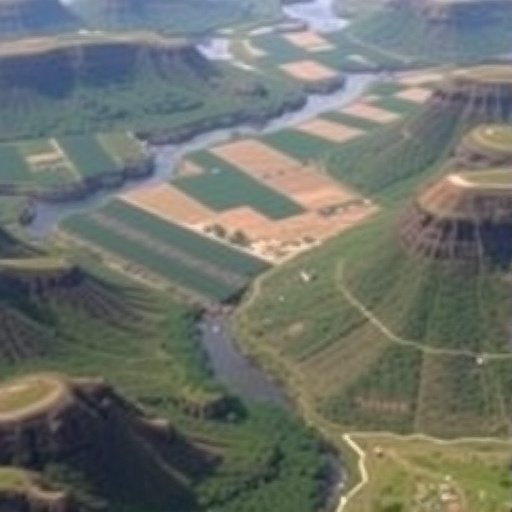The escalating dietary shift towards animal protein consumption in China has initiated transformative changes in global agricultural dynamics, significantly impacting Brazil, one of the leading exporters of protein-rich animal feed in the world. As China’s demand for animal proteins surges, the implications for Brazil’s agriculture—particularly concerning land and water resources—become undeniably apparent. This geopolitical exchange raises critical questions about sustainability, environmental degradation, and future agricultural practices in both nations.
One of the most striking statistics emanating from this synergistic relationship is that Brazil supplies approximately 10% of the total protein consumed in China, with a staggering 24–29% of the animal proteins integral to the Chinese diet originating from Brazilian soybeans. As Chinese consumers increasingly embrace diets rich in animal proteins, Brazil’s role becomes more pronounced, unearthing a complex web of ecological implications tied to this vibrant trade network.
In 2020, China’s insatiable appetite for Brazilian soybeans translated to an estimated virtual import of about 17.8 million hectares of Brazilian land. This figure encapsulates the massive scale of land resources that are indirectly affected by the agricultural demands of the Chinese market. The importance of this land conversion cannot be understated, as it directly correlates with deforestation risks and the depletion of natural habitats, which are becoming increasingly threatened by agricultural expansion.
While irrigation systems remain relatively underdeveloped in Brazil, rainfall emerges as a primary source of water for soybean cultivation. This reliance on rainwater highlights the intrinsic relationship between agricultural practices and local climate conditions. As water scarcity becomes a growing concern globally, understanding how virtual water trade affects water resources in both Brazil and China is essential for achieving sustainable agricultural practices.
Notably, despite a reduction in direct deforestation linked to soybean production in Brazil, indirect deforestation continues to present significant challenges. The phenomenon of one land use displacing another—often due to agricultural encroachment—remains persistent even as Brazil strives to implement more sustainable farming practices. This ongoing trend raises crucial considerations about the long-term impacts of agricultural expansion on biodiversity and ecosystem services.
The interconnectedness of global dietary shifts and environmental pressures cannot be overstated. China’s heightened demand for animal proteins not only drives Brazil’s agricultural expansion but also heightens the risks faced by vulnerable ecosystems. The balance between meeting economic needs and preserving environmental integrity is increasingly delicate, and stakeholders in both countries must navigate these challenges with strategic forethought.
As Brazil continues to fulfill China’s dietary needs, the implications of this agricultural symbiosis will resonate in multiple directions. Stakeholders, including farmers, policymakers, and environmental advocates, must work collaboratively to align practices with sustainable frameworks that mitigate deforestation and preserve biodiversity. An essential part of this dialogue will focus on enhancing farming techniques and technology to optimize land use while minimizing environmental consequences.
Moreover, the increasing reliance on Brazilian soybeans reflects broader trends in globalization and interconnected trade relationships. Nations are increasingly dependent on each other for various commodities, including food resources, and this interdependence calls for a reevaluation of agricultural practices to better reflect global environmental challenges. As countries pursue agricultural advancements, they must also prioritize ecological stewardship through responsible land management.
The role of public awareness is paramount in driving change in this dynamic. Consumers, particularly in China, hold significant power to influence agricultural practices by choosing sustainably sourced products. While making informed choices can directly impact the welfare of ecosystems and communities, raising awareness about the hidden costs of consumption pathways can catalyze broader trends toward sustainability across global markets.
In addition to consumer pressure, scientific communities and researchers are integral in providing actionable insights into the best agricultural practices. Innovations in agricultural technology, including precision farming and integrated pest management strategies, can play a vital role in transforming agriculture into a more sustainable enterprise. Investing in agricultural research and solutions will help reconcile the imperatives of production with the need to mitigate ecological damages associated with agricultural expansion.
As we look toward the future, the implications of Brazil and China’s agricultural dynamics will continue to unfold, presenting both challenges and opportunities. Stakeholders must engage in stellar collaborations to minimize environmental impacts while fulfilling the demands of growing populations. Innovation, sustainability, and responsible trade policies must work in tandem to create a socially equitable future for both nations.
These developments serve as a stark reminder of the urgency with which stakeholders must act. The ecological ramifications of global dietary preferences extend beyond borders, prompting a collective call to acknowledge and address these interconnected challenges. The pathway towards achieving sustainable agricultural practices requires a multifaceted approach, prioritizing not only economic interests but also the preservation of livelihoods and ecosystems for generations to come.
In conclusion, the intricate links between China’s appetite for animal proteins and Brazil’s agricultural landscape reveal a multi-layered narrative about the future of global food systems. As both nations navigate this landscape, their choices will reverberate far beyond their borders, influencing ecosystems and agricultural practices worldwide. The quest for sustainable solutions will be paramount in ensuring that economic growth harmonizes with environmental stewardship, safeguarding the planet’s resources for years to come.
Subject of Research: The environmental consequences of China’s reliance on Brazilian soybeans for animal protein consumption.
Article Title: China’s animal-protein-rich diets are increasingly reliant on Brazil’s land and water resources.
Article References:
Govoni, C., Zhuo, L., Marchioni, D.M. et al. China’s animal-protein-rich diets are increasingly reliant on Brazil’s land and water resources.
Nat Food (2025). https://doi.org/10.1038/s43016-025-01238-4
Image Credits: AI Generated
DOI:
Keywords: China, Brazil, animal protein, soybean trade, environmental impact, agricultural practices, deforestation, sustainability, virtual land, water resources.
Tags: animal feed export dynamicsBrazil’s agricultural impactChina’s demand for animal proteindeforestation risks in Brazildietary shifts towards animal proteinsecological implications of tradeenvironmental degradation in Brazilfuture agricultural practices in China and Brazilgeopolitical agriculture relationshipsland and water resource strainsoybean trade between China and Brazilsustainability in global agriculture





